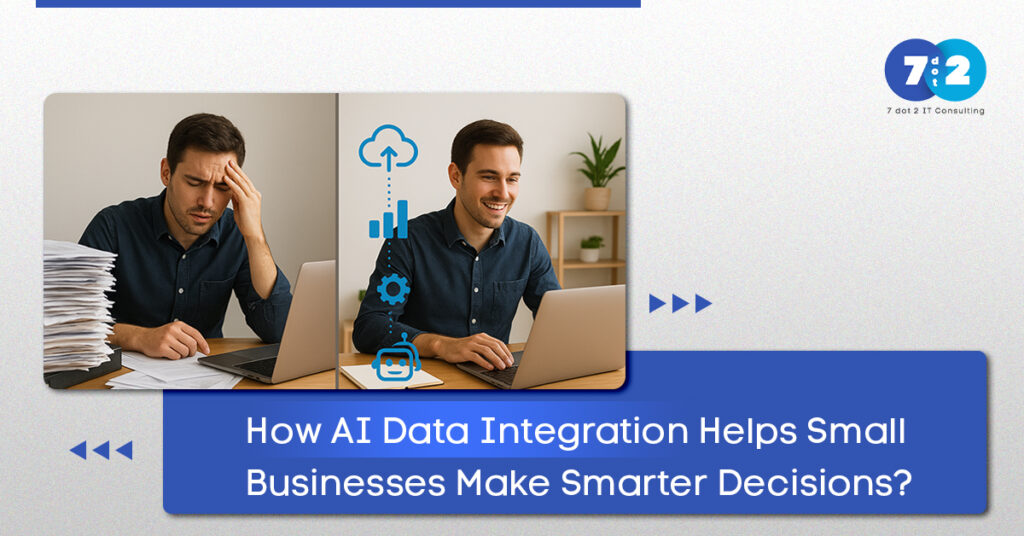How AI Data Integration Helps Small Businesses Make Smarter Decisions
Posted on : 23 Sept 2025 at 13:06 pm, by Puneet Aggarwal, Founder 7 dot 2 IT Consulting

In today’s business environment, data is one of the most valuable assets for small and medium enterprises (SMEs). From customer interactions and sales records to social media engagement and website analytics, the volume of data generated daily is staggering. Yet, much of this data remains underutilized because it is scattered across systems, difficult to manage, and time-consuming to analyse.
This is where AI for small business operations is proving transformative. By leveraging intelligent tools for streamlining business data, SMEs can move beyond manual processes to harness insights that fuel growth and innovation. In this blog, we’ll explore what AI data integration is, why it really matters, and what the future holds for this technology.
What is AI Data Integration?
Think of a small business collecting information from multiple sources, its online store, CRM, social media channels, and customer service platforms. Traditionally, unifying this data was like sorting papers in filing cabinets across different rooms. AI data integration acts as a smart assistant that not only brings these “cabinets” together but also organizes, cleans, and interprets the data.
For startups and SMEs, this means faster access to high-quality data, enabling data-driven decisions for startups and providing a foundation for business intelligence for small businesses.
Why AI Data Integration Matters
Here are some of the reasons why AI data integration matters:
1. Empowering Data-Driven Decisions: AI transforms raw, fragmented data into actionable insights. For small business data analytics, this means spotting trends in customer behaviour, forecasting demand, and identifying inefficiencies – factors that directly inform smarter decision-making.
2. Driving Competitive Advantage: In crowded markets, agility is key. Leveraging AI for business strategy allows SMBs to adapt quickly, anticipate challenges, and seize opportunities, creating a distinct competitive advantage for SMEs.
3. Enhancing Security and Reliability: Beyond efficiency, AI tools strengthen data security by detecting anomalies or threats in real-time. This additional layer of protection ensures that businesses can innovate confidently without compromising on trust.
Benefits of AI Data Integration
Listed below are some of major benefits of AI data integration.
1. Cost Reduction and Resource Optimization: AI minimizes inefficiencies, reduces waste, and ensures resources are allocated optimally. For example, retailers can manage inventory more effectively while energy firms can track usage patterns to cut costs.
2. Automation and Efficiency: Tasks like data cleansing, mapping, and schema matching which traditionally required manual expertise are now automated. This frees IT teams to focus on more strategic priorities.
3. Handling Complex and Unstructured Data: From social media posts to emails and sensor readings, AI can process diverse data types. This enables small businesses to uncover insights that would otherwise remain hidden.
4. Improved Data Quality and Consistency: AI continuously monitors and corrects errors, ensuring reliable data for analytics and reporting. Consistent, high-quality data supports more accurate small business data analytics and decision-making.
5. Predictive Insights and Continuous Learning: AI not only interprets current data but also anticipates future needs. By learning from past integrations, AI systems evolve, becoming more efficient at streamlining business data and supporting long-term AI tools for small business growth.
Challenges in AI Data Integration
While opportunities are immense, SMEs must also address the following challenges:
1. Ethical Concerns: AI models may reflect biases in data, leading to unfair decisions.
2. Data Privacy Risks: Sensitive information must be handled responsibly to prevent breaches.
3. Skills Gap: Over-reliance on automated systems without human oversight can weaken decision-making quality.
4. Balancing AI and Human Judgment: AI should augment, not replace, strategic thinking.
The Future Outlook
With the global AI market projected to grow exponentially in the coming years, AI for small business is no longer a luxury but a necessity. SMEs that adopt AI tools for small business growth will not only streamline operations but also future-proof their strategies in an increasingly data-driven economy.
By embedding AI into business intelligence for small businesses, owners can unlock new insights, mitigate risks, and strengthen customer relationships. Ultimately, this positions start-ups and SMEs to grow with smarter, faster, and more confident decisions.
Conclusion
Data has the power to make or break a business. For small enterprises and start-ups, integrating AI into data workflows is the key to unlocking this power. By streamlining business data, improving accuracy, and delivering predictive insights, AI equips SMEs with a clear competitive advantage for SMBs.
As the business landscape continues to evolve, embracing AI for business strategy will not just support smarter decisions; it will also define long-term success. At 7 dot 2 IT Consulting, we are committed to helping small businesses harness AI-driven solutions that empower growth, strengthen decision-making, and create lasting impact.
